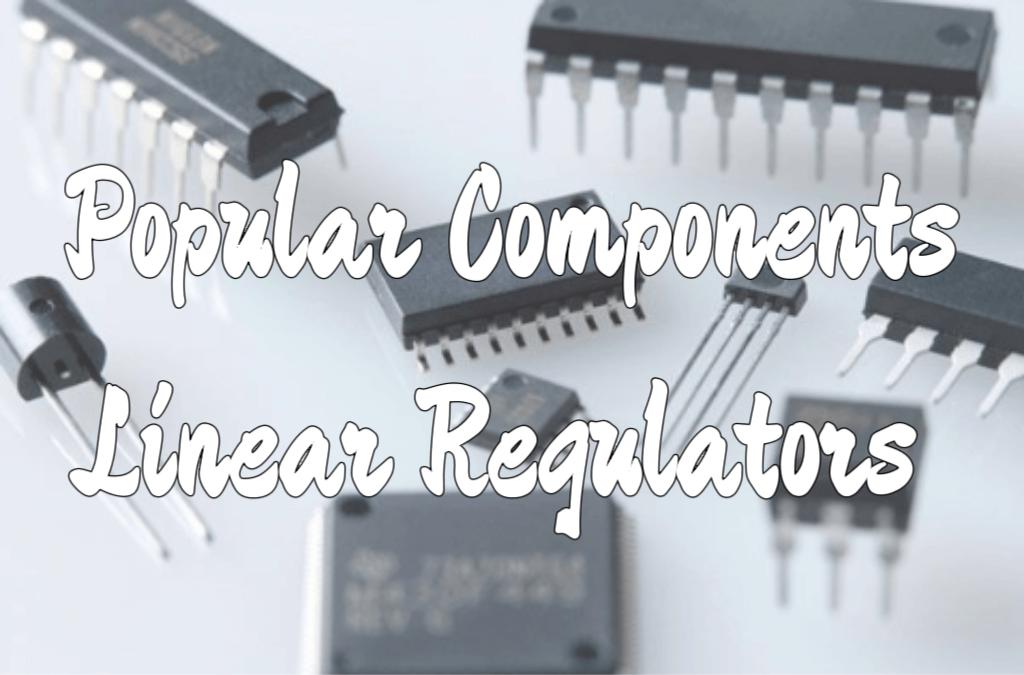In-depth Analysis of Popular Linear Regulators Components
 Linear regulators are a common type of power management IC that converts input voltage into a stable output voltage through linear regulation. They are widely used in various electronic devices to provide a stable power supply. Recently, several popular models of linear regulators have garnered significant market attention. This article will provide a detailed introduction to these linear regulators ic models and offer selection recommendations.
Linear regulators are a common type of power management IC that converts input voltage into a stable output voltage through linear regulation. They are widely used in various electronic devices to provide a stable power supply. Recently, several popular models of linear regulators have garnered significant market attention. This article will provide a detailed introduction to these linear regulators ic models and offer selection recommendations.
Popular Linear regulators ModelsIntroduction
1. UMW AMS1117-3.3
The AMS1117-3.3 is a three-terminal low-dropout linear regulator with an output current of up to 1A and an output voltage of 3.3V. The dropout voltage is only 1.2V at 1A. It features a low dropout voltage, high output current, low linear temperature coefficient, and ESD resistance exceeding 15kV. It is suitable for power supplies in digital circuits such as microcontrollers, microprocessors, and digital signal processors, as well as in communication circuits like wireless communication devices, network equipment, and fiber optic transceivers.
2. Texas Instruments TLV1117LV33DCYR
This model is a low-dropout (LDO) linear regulator with a quiescent current as low as 100µA. The input voltage range is 2V to 5.5V, with an output voltage of 3.3V and an output current of 1A. The dropout voltage is 455mV at 1A, and it features over-temperature shutdown and over-current protection. It is suitable for applications in signal processing, consumer electronics, computers and peripherals, communication and networking, and power management.
3. Fairchild Semiconductor LM317T
The LM317T is an adjustable positive voltage regulator with an output current of up to 1.5A. The output voltage can be adjusted between 1.2V and 37V. It features internal thermal overload protection and short-circuit current limiting, and it is packaged in a TO-220 case. Due to its adjustability, the Fairchild LM317T is widely used in various electronic devices that require variable voltage, such as laboratory power supplies and adjustable voltage power supplies.
4. STMicroelectronics L78M05CDT-TR
The L78M05CDT-TR is a linear regulator from STMicroelectronics with an output voltage of 5V and an output current of 500mA. It has good load and line regulation capabilities and is packaged in a TO-220 case. It is commonly used in devices that require a stable 5V power supply, such as small electronic devices and sensors.
5. MPS MP2002DD-LF-Z
The MP2002DD-LF-Z is a linear regulator from MPS with a high input voltage range and stable output voltage. The output current is 2A, and it is packaged in a SOT-23 case. It is suitable for devices with high power supply stability requirements, such as communication equipment and industrial control systems.
6. Texas Instruments TLV70450DBVR
The TLV70450DBVR is a linear regulator from Texas Instruments, featuring low quiescent current and high PSRR (Power Supply Rejection Ratio). It has an output voltage of 5V and an output current of 500mA, and it is packaged in a TO-252 case. It is suitable for devices that are sensitive to power supply noise, such as audio equipment and precision instruments.
Linear Regulators Selection Recommendations
When selecting a linear regulator, it is essential to determine the appropriate model based on specific application requirements. Here are some selection recommendations:
1. Input Voltage Range and Dropout Voltage
● High-voltage input scenarios (e.g., industrial power supplies): Prioritize L78M05CDT-TR or LM317T.
● Low dropout voltage requirements (e.g., lithium battery-powered devices): Recommend TLV1117LV33DCYR or MP2002DD-LF-Z.
2. Output Current and Power Consumption
● High-current applications (>1A): Choose MP2002DD-LF-Z (2A) or LM317T (1.5A).
● Low-power consumption scenarios: TLV70450DBVR (150mA, 1µA quiescent current) is an ideal choice.
3. Packaging and Space Constraints
● Compact designs: TLV70450DBVR (SOT-23) and AMS1117-3.3 (SOT-223) are suitable for PCB space-constrained applications.
4. Cost and Supply Chain
● Budget-sensitive projects: AMS1117-3.3 and LM317T offer significant cost advantages.
● High-reliability requirements: TLV1117LV33DCYR (TI) and L78M05CDT-TR (ST) have stable supply chains.
Comparison &Analysis of Linear Regulators models
Model | Input Voltage Range (V) | Output Voltage (V) | Output Current (A) | Dropout Voltage (V) | Package Type | Features |
UMW AMS1117-3.3 | 4.75–12 | 3.3 (fixed) | 1.0 | 1.2 @1A | SOT-223 | Low cost, basic protection |
TLV1117LV33DCYR | 2.5–6 | 3.3 (fixed) | 0.8 | 0.85 @0.8A | SOT-223 | Low dropout, low quiescent current |
LM317T | 4.2–40 | 1.25–37 adjustable | 1.5 | 3.0 @1.5A | TO-220 | Adjustable, high input voltage tolerance |
L78M05CDT-TR | 7–35 | 5.0 (fixed) | 0.5 | 2.0 @0.5A | TO-252 | High reliability, industrial grade |
MP2002DD-LF-Z | 2.5–5.5 | 1.2–3.3 adjustable | 2.0 | 0.4 @2A | DFN-8 | Ultra-low dropout, high current |
TLV70450DBVR | 2.0–5.5 | 5.0 (fixed) | 0.15 | 0.5 @0.15A | SOT-23 | Low quiescent current, high PSRR |
The selection of linear regulators should take into account input and output parameters, power consumption, packaging, and cost. For applications that prioritize low dropout voltage and high efficiency, MP2002DD-LF-Z and TLV1117LV33DCYR stand out; for ultra-low standby power consumption, TLV70450DBVR is the preferred choice; and classic designs like LM317T and L78M05CDT-TR continue to hold important positions in high input voltage and industrial applications.
Additionally, in practical applications, it is necessary to conduct detailed evaluations and tests in combination with specific circuit designs and usage environments to ensure that the selected model meets the power supply requirements of the device.
Website: www.conevoelec.com
Email: info@conevoelec.com








